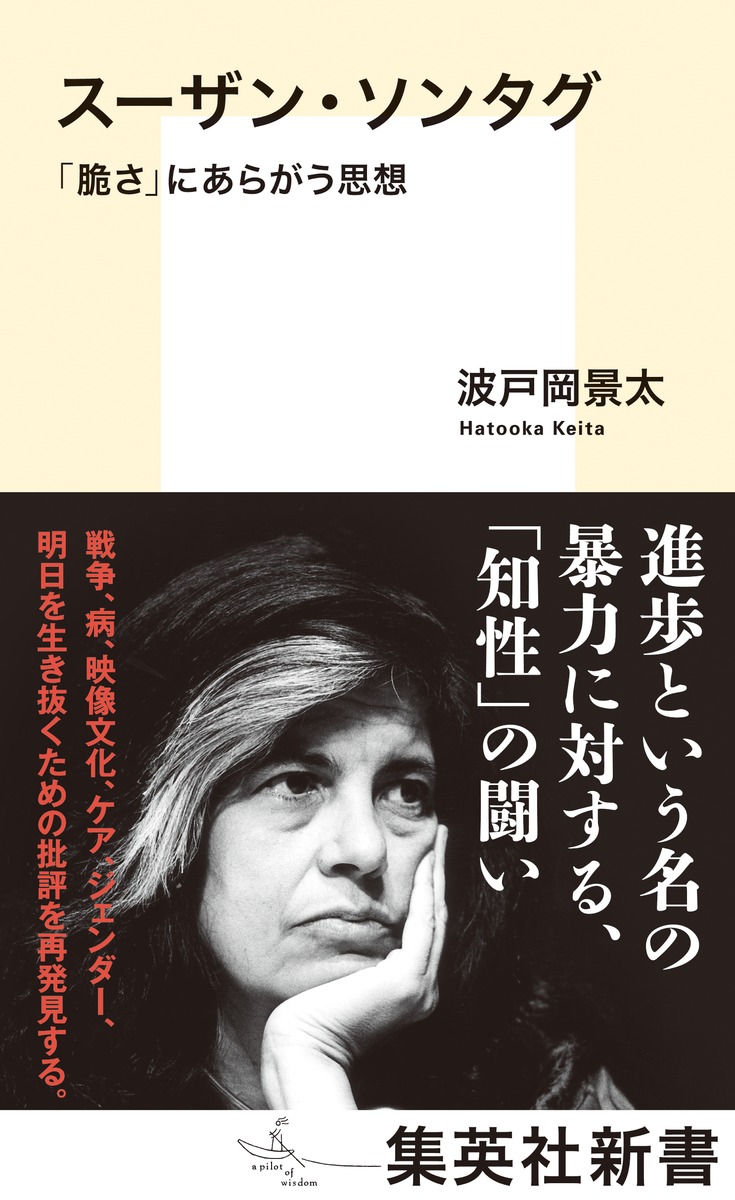こんにちは。
いよいよ2024年度の始まりですね。
私は、17年間通った明治大学の生田キャンパスを離れ、本日より、法政大学の市ヶ谷キャンパスがホームとなります。
所属は、同大学文学部英文学科。
英米文学講義(今年度はポストモダン文学)や英米文学演習(今年度はアジア系アメリカ文学)などを担当します。
学生さんたちのキャンパスライフが少しでも充実するよう、私なりにできることをしていけたらと思います。
今後ともどうぞよろしくお願いいたします。
2024年4月1日 波戸岡景太
こんにちは。
いよいよ2024年度の始まりですね。
私は、17年間通った明治大学の生田キャンパスを離れ、本日より、法政大学の市ヶ谷キャンパスがホームとなります。
所属は、同大学文学部英文学科。
英米文学講義(今年度はポストモダン文学)や英米文学演習(今年度はアジア系アメリカ文学)などを担当します。
学生さんたちのキャンパスライフが少しでも充実するよう、私なりにできることをしていけたらと思います。
今後ともどうぞよろしくお願いいたします。
2024年4月1日 波戸岡景太
とても嬉しいことに、本日、朝日新聞と毎日新聞の両紙で、拙著『スーザン・ソンタグ』(集英社新書)の書評が掲載されました。評者の三牧聖子先生、橋爪大三郎先生、ありがとうございます。
・朝日新聞「好書好日」
https://twitter.com/BOOK_asahi_com/status/1745951994316263893
「『反解釈』『写真論』『他者の苦痛へのまなざし』等を著し、挑発的な議論を続けたスーザン・ソンタグは、今こそ顧みられるべき人物だ」(三牧聖子氏)・毎日新聞「今週の本棚」
https://twitter.com/mainichi_books/status/1746036436527452405
「スーザン・ソンタグは、半世紀ほど前に一世を風靡したアメリカの知識人。最先端の感性とひと筋縄で行かない思考回路をそなえている」(橋爪大三郎氏)10月29日に開催された書店イベント『スーザン・ソンタグ 「脆さ」にあらがう思想』刊行記念対談(都甲先生&波戸岡)が、集英社新書プラスのウェブサイトに公開されました。お時間のあるときに、ぜひご一読ください!
来週発売となる拙著『スーザン・ソンタグ:「脆さ」にあらがう思想』の記念イベントを、今月末、三鷹の素敵な書店 UNITÉで開催します。お相手いただくのは、アメリカ文学研究者の都甲幸治先生。都甲先生には最新の世界文学事情もお伺いしつつ、いまなぜソンタグなのかをトコトン語り尽くす90分にしたいと思います!
************************
刊行記念イベント
「生誕90周年! 今こそスーザン・ソンタグ入門」
登壇者:波戸岡景太、都甲幸治
日時:10月29日(日)18:30スタート
【来店参加】 https://unite-books.shop/items/65277fc1808e2c002d9449df
【オンライン参加】https://unite-books.shop/items/65277fff029af10033fa21c5
本日、10月6日発売の『群像』11月号に、古川日出男さんの最新小説『の、すべて』をめぐる論考が掲載されました。1001枚の古川ワールドを読み解く、最初の一手となることを願っています。同時掲載のロングインタビュー(聞き手は小澤英実先生)も、とても楽しみです!

https://gunzou.kodansha.co.jp/indexes/1869

共著『アメリカ文学と大統領』(南雲堂)が、ついに発売されました。私の担当はニクソンです(第17章「チェッカーズ・スピーチをもういちど:犬とニクソンの伴侶種宣言』)。重厚な一冊、夏休みのおともにぜひ!
歴代大統領とともにアメリカ文学史を駆け抜ける!!
1789 年4 月、ジョージ・ワシントンが大統領就任演説を行なって以降、アメリカの歴史はつねに大統領とともにあった。行政府の長であり、米軍の最高司令官である彼らは、同時に国を表すアイコンであり、アメリカ的想像力の源でもあった。時代毎の大統領が書き残してきた日記や手記、演説原稿、手紙や政治的文書の一群は、アメリカン・ナラティヴの系譜と不可分である。大統領をも文学者とみなし、大統領の歴史と文学思想史のスリリングな共犯関係を追い続けてきた巽孝之教授の退職記念論文集である本書では、教授の薫陶を受けた26 名の研究者が参集し、全く新しいアメリカ文学史のかたちを切り拓く。(版元HPより)
【監修】
巽孝之
【編纂】
大串尚代/佐藤光重/常山菜穂子
【執筆陣】
小泉由美子/大串尚代/大和田俊之/佐藤光重/冨塚亮平/田ノ口正悟/竹野富美子/白川恵子/松井一馬/細野香里/常山菜穂子/奥田暁代/辻秀雄/山根亮一/加藤有加織/濟藤葵/波戸岡景太/麻生亨志/有光道生/中垣恒太郎/秋元孝文/深瀬有希子/長澤唯史/志賀俊介/鈴木透
【コラム】
宇沢美子/内田大貴/榎本悠希
A5 判上製 510 ページ 定価(本体5,800 円+ 税)
ISBN978-4-523-29333-0 C3098
構造主義から翻訳論までを射程に入れた入門書『批評理論を学ぶ人のために』(小倉孝誠・編)が、来月(4月20日)世界思想社より刊行されます。私の担当は、環境と文学の関係を批評する「エコクリティシズム」。ASLE(文学・環境学会)の設立から、人新世なる概念の誕生にいたるまでを概観しつつ、章の後半では、林京子と古川日出男のテクストを用いて、私なりのエコクリティシズムを実践しています。機会がありましたら、ぜひご一読ください。
目次
はじめに
Ⅰ 記号と物語
第1章 構造主義(下澤和義)
第2章 物語論(赤羽研三)
第3章 受容理論(川島建太郎)
第4章 脱構築批評(巽孝之)
◆コラム 法と文学(川島建太郎)
Ⅱ 欲望と想像力
第5章 精神分析批評(遠藤不比人)
第6章 テーマ批評(小倉孝誠)
第7章 フェミニズム批評(小平麻衣子)
第8章 ジェンダー批評(小平麻衣子)
第9章 生成論(鎌田隆行)
◆コラム 研究方法史の不在(小平麻衣子)
Ⅲ 歴史と社会
第10章 マルクス主義批評(竹峰義和)
第11章 文化唯物論/新歴史主義(山根亮一)
第12章 ソシオクリティック(小倉孝誠)
第13章 カルチュラル・スタディーズ(常山菜穂子)
第14章 システム理論(川島建太郎)
第15章 ポストコロニアル批評/トランスナショナリズム(巽孝之)
◆コラム 文学と検閲(小倉孝誠)
Ⅳ テクストの外部へ
第16章 文学の社会学(小倉孝誠)
第17章 メディア論(大宮勘一郎)
第18章 エコクリティシズム(波戸岡景太)
第19章 翻訳論(高榮蘭)
◆コラム 世界文学──精読・遠読・翻訳(巽孝之)
あとがき
参考文献
事項索引
人名・作品名索引
昨年から準備してきた単著が、いよいよ今秋刊行となります。
タイトルは、Thomas Pynchon's Animal Tales: Fables for Ecocriticism (Lexington Books, 2022)。
博論と和書『ピンチョンの動物園』を下敷きにしながら、本編2章分と、序章・終章を書き下ろし、そして、過去の発表論文もほとんどすべて改稿して再編集しました。
思えば、文学のなかの動物たちについて私が本格的にリサーチを始めたのは、いわゆるゼロ年代がスタートし、そしてすぐに9/11の悲劇が起きた頃のことでした。あれから20年以上の月日が流れ、動物と人間の関係も、そのねじれた関係をより一層こじらせてしまったような気がします。
そのこじらせ具合を、ピンチョンという複雑怪奇な物語作家の力を借りて再表現し、そして、叶うならば、そこからまた新たな明日を生きるための「寓話」を紡ぎ出したい――というのが、本書をまとめた最大の動機です。
書き下ろしと加筆改稿に際しては、「ソラスタルジア」「代替肉」「保険」「環境ドキュメンタリー」といった、ここ数年でいよいよその重要性を増しているコンセプト/トピックを導入しました。
機会がありましたら、ぜひお手にとってみてください!
___________________
アメリカ文学をめぐるエッセイをまとめた『ロケットの正午を待っている』(2016)は、「ホロコースト」と現代小説の距離という、そのテーマの重たさもさることながら、本文すべてを金属活字活版で印刷していただいたことでも、とても思い出ぶかい一冊です。
アメリカのレキシントン・ブックスから刊行されているエコクリティシズム論集Reading Cats and Dogs(2020)に、谷川俊太郎の「犬」をめぐる拙論が収録されています。Kindle版もありますので、機会がありましたら、ぜひ!
Let the Sleeping Dogs Tell Lies: Companionship and Solitude in Shuntarō Tanikawa’s Dog Poems
Keita Hatooka
“If dogs could talk / They would tell lies like me,” writes Shuntarō Tanikawa, one of Japan’s most prominent contemporary poets, in his poem “A Lie” (Naked; my trans.). Since his impressive debut with five poems published in a literary magazine in 1950 and the collection of free verse Two Billion Light-Years of Solitude (1952), he has not only published almost a 100 collections of poetry but has also become well-known throughout Japan through his simple and, at times, humorous poems. This includes his lyrics for the theme song to Astro Boy (1963), the first TV cartoon broadcast in Japan. His popularity is due to his humanistic messages and simple, heartfelt language. However, Tanikawa states forthrightly that he doubts language can truly be useful when communicating with his loved ones, as shown in the opening lines of “A Lie.” A little boy, the narrator of this poem, is confused by his mother who tells him not to lie, because he thinks he probably cannot help telling lies. He guesses that she has also lied before and been hurt, justifying the lying by supposing that even dogs would do so if they could speak. The poem’s subject implies that a lie can be placed even at the center of mother–child communication; the feelings of life are always translated falsely and misrepresented through human language.
As a poet for children, Tanikawa has little difficulty making dogs talk. He has anthropomorphized the dog by adapting Aesop’s Fables. As a translator, he introduced the thoughts of Snoopy, the beagle of Peanuts, to Japanese readers. Moreover, he revived mysterious old rhymes as brand-new Japanese poems in Mother Goose Rhymes. However, as a modern poet, he carefully walks around language with his imaginary dog. In the poem “Sidewalk Shop,” Tanikawa metaphorically describes the language, and its meaning would be a casing and filling tube of sausage, saying “[if you] hang the sausages in the window of the shop, / Hungry dogs will come irresistibly” (Floating the River in Melancholy; my trans.).
Sometimes Tanikawa’s dog unintentionally steps on a collection of poems dismissed on the street. The collection is one of the books that nobody would read and whose lines, words, and verses are becoming meaningless and return to the air. In such a miserable scene, Tanikawa’s dog happens to walk alone on the street. “Just after treading on the collection of poems soaked in the rain,” writes the poet, “The dog suddenly returns and sniffs it, / And then wags its tail” (Shi Ni Tsuite; my trans.; 84–85). Within the context of the poem’s metaphor, the dog seems to take a great interest in human language. The poet captures the dog’s interest, not through words but by turning those words into the very air, allowing the dog to sniff the air.
明治大学大学院理工学研究科の建築・都市学専攻にある総合芸術系の波戸岡研究室より、2名の博士(学術)の学位取得者が誕生しました。
武田 寿恵さん:論文題目「国際文化都市創出のためのブロードウェイ・ミュージカル国産化に関する表象文化論的研究」
劉 霊司馬さん:論文題目「現代中国における「抗洪救災」をめぐる環境表象論的研究:黒竜江省哈爾浜市の事例を中心に」
二人とも、長い年月をかけて研究対象に向き合い続け、その結果、今ようやく、対象の向こう側に広がる果てしのない世界の入口に立つことができました。
おめでとう。
そして、